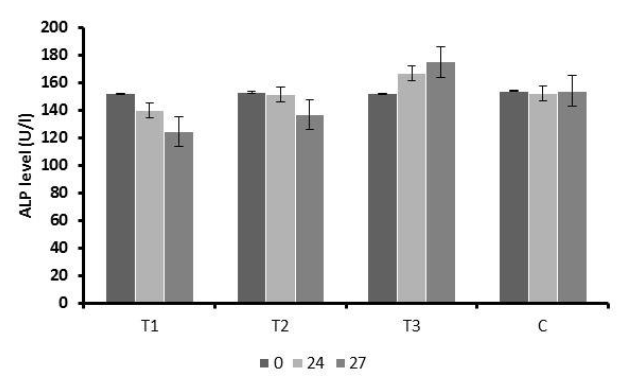Investigation of the effects of Bifidobacterium bifidum as a probiotic on liver function enzymes due to exposure to E.coli O157H7 in Koi fish (Cyprinus rubrofuscus)
DOI:
https://doi.org/10.17762/sfs.v8i2.49Keywords:
Bifidobacterium bifidum, E.coli O157H7, Koi fish, Cyprinus Rubrofuscu Alanin e aminotransferase, Aspartate aminotransferase, Alkaline phosphataseAbstract
Under intensive aquaculture conditions, fish are exposed to many pathogens, due to that strengthening their immune system is an alternative significant way to reduce mortality rate and disease-related complications. Probiotics are valuable oral nutrition supplements for this purpose. In the present investigation, there were used Koi fish (n=120) with the characteristics of 10±3 Cm in length and an average of 20±1 g in weight classified in 4 groups under 2 replication. The classification of groups was as follow: T1; 24-day treated with the probiotic diet of Bifidobacterium bifidum (1.5×108 CFU/ mL), T2; 24-day treated with the probiotic diet of Bifidobacterium bifidum and 72 hours of exposure to E.coli O157H7 pathogen (1.5×108 CFU/ mL), Sham group; 24-day probiotic-free commercial feed treatment and 72 hours of exposure to E.coli O157H7, and control group (C); which had fed neither the probiotics nor any pathogens. In the present scientific investigation, the feeding processes were done twice a day at 10:00 a.m. and 2:00 p.m. where the samples were stored at 12:12 cycle of dark and light. ALT, AST and ALP serum levels were examined to determine the symptoms of disease caused by the pathogen. These liver function tests (LFT) were examined on days 24 and 27. As a conclusion, it is found that probiotic complements feeding cause to decrease the LFT level compared with the control group on days of 24 and 27 (p<0.05). Also, in the probiotic-fed group, after exposure to the pathogen, the level of serum LFT increased compared with the control group (p<0.05), the probiotic utilization as a supplement reveals the better efficiency of the liver during ageing, as well (p<0.05).










